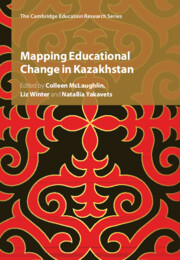Book contents
- Mapping Educational Change in Kazakhstan
- Mapping Educational Change in Kazakhstan
- Copyright page
- Dedication
- Contents
- Figures
- Tables
- Contributors
- Preface
- Acknowledgements
- Introduction
- Part I Foundations of Scaling Up
- Part II Piloting Initiatives and Scaling Up to the Whole System
- Part III Evidence of Implementation
- 12 The Aims and Methods of Evidence Collection
- 13 Regional Case Study 1
- 14 Regional Case Study 2
- 15 Regional Case Study 3
- 16 Beyond Piloting
- Conclusions
- Select Bibliography: School-Level Educational Reforms in Kazakhstan, 2011–2022
- Index
- References
15 - Regional Case Study 3
A Regional Study of Stakeholders’ Perspectives on Education Reform in Kazakhstan
from Part III - Evidence of Implementation
Published online by Cambridge University Press: 09 November 2023
- Mapping Educational Change in Kazakhstan
- Mapping Educational Change in Kazakhstan
- Copyright page
- Dedication
- Contents
- Figures
- Tables
- Contributors
- Preface
- Acknowledgements
- Introduction
- Part I Foundations of Scaling Up
- Part II Piloting Initiatives and Scaling Up to the Whole System
- Part III Evidence of Implementation
- 12 The Aims and Methods of Evidence Collection
- 13 Regional Case Study 1
- 14 Regional Case Study 2
- 15 Regional Case Study 3
- 16 Beyond Piloting
- Conclusions
- Select Bibliography: School-Level Educational Reforms in Kazakhstan, 2011–2022
- Index
- References
Summary
This chapter presents results of the local implementation of the Renewed Content of Education (RCE) in schools in one large urban city. In line with the focus of Part III, the authors discuss how educational policy translates through the system via regional authorities to schools, teachers, parents and students in the city. They draw on data collected in three mainstream, non-selective schools located in different districts of the city. These schools varied in terms of their numbers of pupils, and each school’s developmental history, students, parents and community composition. The main research instruments used for data collection were semi-structured interviews and focus group discussions with school principals, vice-principals, teachers, parents and students. The key purpose was to gain participants’ perspectives on the value of the RCE and their judgements and reaction to the educational innovations in their schools. The authors discuss the role of administrative support and collaboration and some unique features of the implementation process, such as work in clusters of schools and how this and other strategies fostered the implementation of these educational innovations.
- Type
- Chapter
- Information
- Mapping Educational Change in Kazakhstan , pp. 257 - 280Publisher: Cambridge University PressPrint publication year: 2023

